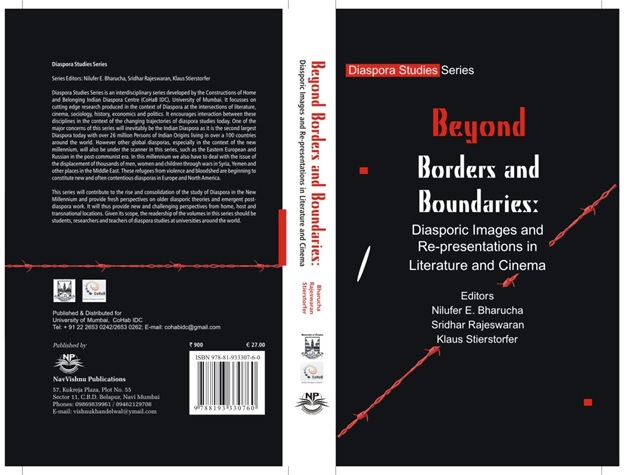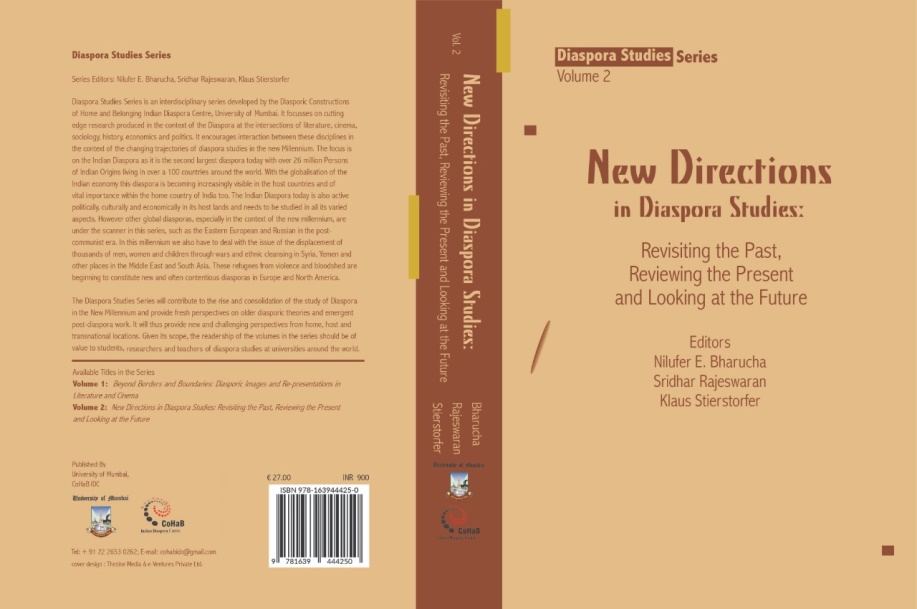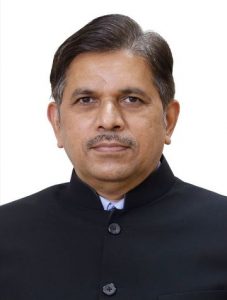Constructions of Home and Belonging – Indian Diaspora Centre (CoHaB IDC)
The CoHaB IDC is the second phase of the Diasporic Construction of Home and Belonging (CoHaB) programme at the University of Mumbai.
CoHaB was initiated in 2012 as a Multidisciplinary International research programme under the auspices of the European Union’s Marie Curie Innovative Training Networks. Professor Nilufer E.Bharucha, was the CoHaB Coordinator and Scientist-in-Charge at Mumbai University and Professor Klaus Stierstorfer, University of Muenster, Germany was the overall Coordinator of the programme. In addition to Mumbai and Muenster Universities the other members of CoHaB were the Stockholm University, Sweden and the School of Oriental and African Studies University of London, Oxford and Northampton Universities in the U.K. The CoHaB project also has three associate partners the Centre for Advanced Studies in India (CASII), India, The Migration Policy Group, Belgium and the Cabinet d’Avocats, France.
The CoHaB project at Mumbai University has trained three Early Stage Researchers (ESRs) from the USA, Romania and Canada for their Ph.D. degrees in areas of Diasporic literature and cinema from 2012-2015. During this time CoHaB Mumbai has organized a Summer School in 2014 at which ESRs from the other partner universities and their coordinators also participated. Additionally an international conference was organized at Mumbai University in 2015 with CoHaB’s Associate Partner CASII on the theme of going beyond boundaries and borders. CoHaB Mumbai also oraganised technical secondments for its own ESRs and for those of other partner universities at CASII where they studied migration, ecology and partition diasporas. The Mumbai ESRs went for academic secondments to partner universities and Mumbai received ESRs from partner universities too for cooperation and training within the network. The ESRs also had the opportunity to participate and present papers at workshops and conferences on diaspora studies around the world. The three ESRs at Mumbai have successfully completed their research work.
The CoHaB Centre at Mumbai University has gained an excellent status by guiding and producing scholars in the field of Global Diaspora Studies, Ethnicity, Migration, and Identity issues. So when the CoHaB ITN programme reached its conclusion in October 2015, it was felt that the resources of CoHaB and the expertise it had generated should not be allowed to dissipate. So from November 2015 onwards the CoHaB centre at Mumbai University has entered its second phase and is now known as CoHaB Indian Diaspora Centre (CoHaB IDC). It is supported by the Mumbai University and continues to draw upon the expertise and goodwill of its CoHaB partners and associate partners.
Professor Nilufer E. Bharucha is the Director and Scientist-in-Charge of CoHaB IDC. The Centre has appointed Ms. Kirti Risbud as Research Associate and she assists the Director in administration and academic activities of the Centre.
CoHaB IDC functions as a Resource Centre and also regularly invites research scholars from across the nation and the globe for workshops, talks and seminars. Its objective is to promote studies on the Indian Diaspora. It makes available its resources of books, critical materials and DVDs to students and research scholars. Research scholars from around the world are welcomed to the centre and their projects are facilitated through contacts with scholars, writers and activists in diverse fields of Diaspora Studies. CoHaB IDC has a student-friendly policy and its computers and internet facilities are available to students who wish to carry on their research/academic reading in a quiet space with internet connectivity. CoHaB IDC also holds regular film viewing sessions, talks, workshops and lectures for students.
The CoHaB IDC has initiated an interdisciplinary Diaspora Studies Series with the help of an international Board of Advisors. The first volume in this series entitled Beyond Borders and Boundaries: Diasporic Images and Re-presentations in Literature and Cinema has been published and the second volume is in the press.
To achieve greater visibility and scholastic impact, CoHaB IDC organizes national and international conferences on Diaspora Studies independently and jointly with other universities and research centres.
CoHaB IDC also has a YouTube channel on which it uploads videos of lectures and conferences. You may access this channel on the URL given below:
- University of Muenster – The CoHaB IDC’s academic collaboration with the University of Muenster predates the actual project and is an outcome of a much older academic relationship between the universities of Mumbai and Muenster.The University of Mumbai has a long standing and active MoU with the University of Muenster, which was signed in 2008 and renewed three times by both the universities.
Under this MoU, student exchanges, faculty visits, joint research projects and joint publications have been undertaken. These activities have been made possible by the active interest taken by Professor Klaus Stierstorfer, the initiator of this collaboration at Muenster University and by Professor Nilufer E. Bharucha, at the Mumbai University.Professor Dr. Klaus Stierstorfer’s academic collaboration with the University of Mumbai goes back even before the formal MoU was signed. In 2005 he had included Mumbai University in a three way collaboration on a joint research project on Literature and Fundamentalism with Muenster and Lyon University, France. This joint project included publications and conferences in Mumbai, Muenster and Lyon. Professor Nilufer E. Bharucha, then Head of the Department of English, University of Mumbai, was the coordinator of this project at Mumbai University.This collaboration had in 2012 culminated in a major multidisciplinary international research programme, Diasporic Constructions of Home and Belonging (CoHaB) under the auspices of the European Union’s Marie Curie Innovative Training Networks. CoHaB is now in the second phase at Mumbai University, as CoHaB Indian Diaspora Centre (CoHaB IDC), in which Professor Stierstorfer is actively involved as a key Advisory Board member.
Professor Stierstorfer is also the co-editor of the CoHaB IDC’s Diaspora Studies Series.
- CoHaB IDC has worked closely with Professor Frank Schulze-Engler, Professor, Goethe University, Frankfurt, and Coordinator of the AFRASO (Africa-Asia Programme). An international joint symposium on ‘Afrasian Interactions: Current Dynamics Future Perspectives’ was organized in June 2018 by CoHaB IDC and AFRASO.The conference was jointly organized by the University of Mumbai, Dr. BMN College Mumbai and Goethe University Frankfurt. The speakers at the symposium had grappled with the role of transregional Afrasian entanglements in understanding the current dynamics and future perspectives of India-Africa relations. The contributions were interdisciplinary and came from fields such as political science, anthropology, history, memory studies as well as cultural and literary studies.The resultant publications are being published in Matatu Journal for African Culture and Professor Nilufer E. Bharucha, Director CoHaB IDC is one of the co-editors of this issue.
- The CoHaB IDC is currently working on a project to be implemented from 2020 onwards with Professor Dr. Florian Klaeger, University of Bayreuth. To facilitate this project and further collaborations, the University of Bareuth’s Centre of International Excelllence “Alexander von Humboldt” has awarded a short term grant to Professor Nilufer Bharucha, Director CoHaB IDC. She will be visiting Bayreuth in Summer 2021. The aim of Prof. Bharucha’s visit is to explore the potential, at Bayreuth, for an institutionalized platform such as a school for graduate research on diasporic literature and culture. This school would focus on representations of migration and diaspora, in particular with a view to concepts of the future. It would be situated within the emerging field of Cultural Encounters and Transcultural Processes. Interaction at the level of faculty and students is envisaged in this collaboration.
Awards
Pro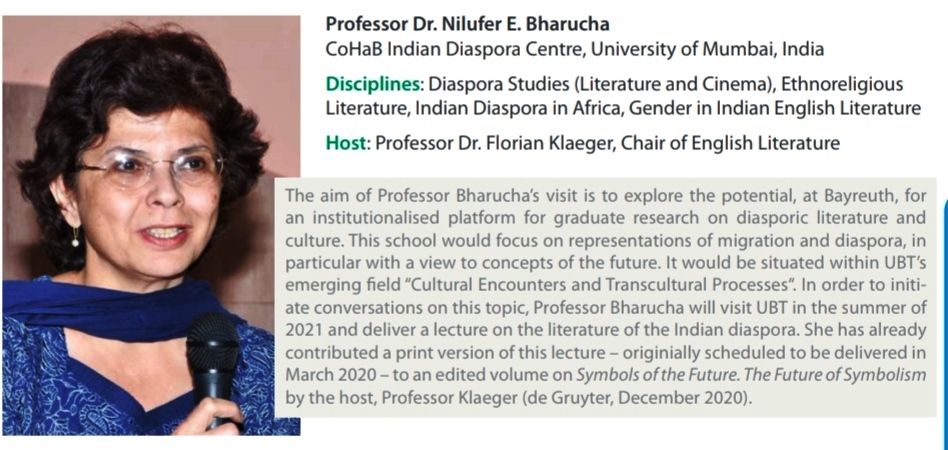 fessor Nilufer E. Bharucha, Director, CoHaB Indian Diaspora Centre, was in 2019-2020 awarded the Short Term Grant of the University of Bayreuth’s Centre of International Excellence “Alexander von Humboldt”. Due to the Covid-19 pandemic she could not take up the award in 2019-20 but will be taking it up in 2021.
fessor Nilufer E. Bharucha, Director, CoHaB Indian Diaspora Centre, was in 2019-2020 awarded the Short Term Grant of the University of Bayreuth’s Centre of International Excellence “Alexander von Humboldt”. Due to the Covid-19 pandemic she could not take up the award in 2019-20 but will be taking it up in 2021.
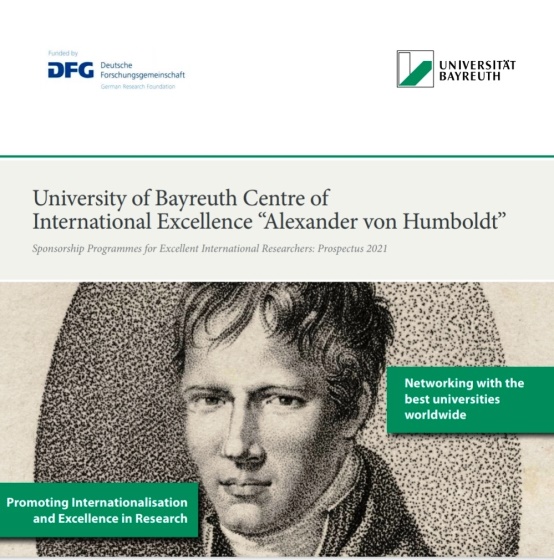 The CoHaB IDC is currently working on a project to be implemented from 2021 onwards in collaboration with Professor Dr. Florian Klaeger, University of Bayreuth. The aim of Professor Bharucha’s visit to Bayreuth, under the aegis of the Humboldt Short Term Grant, would be to explore the potential, for an institutionalized platform such as a school for graduate research on diasporic literature and culture. This school would focus on representations of migration and diaspora, in particular with a view to concepts of the future. It would be situated within the emerging field of Cultural Encounters and Transcultural Processes. Interaction at the level of faculty and students is also envisaged in this collaboration.
The CoHaB IDC is currently working on a project to be implemented from 2021 onwards in collaboration with Professor Dr. Florian Klaeger, University of Bayreuth. The aim of Professor Bharucha’s visit to Bayreuth, under the aegis of the Humboldt Short Term Grant, would be to explore the potential, for an institutionalized platform such as a school for graduate research on diasporic literature and culture. This school would focus on representations of migration and diaspora, in particular with a view to concepts of the future. It would be situated within the emerging field of Cultural Encounters and Transcultural Processes. Interaction at the level of faculty and students is also envisaged in this collaboration.
Fellows:
 CoHaB IDC has from 2019-2020 initiated a Fellowship Programme in the area of Indian Diaspora Studies under which scholars and academics are attached to the Centre for periods ranging from 6 months to 1 year. The Centre provides office space and administrative help to the Fellows for conducting their research. The Fellows are encouraged to conduct lectures and workshops to share their research findings.
CoHaB IDC has from 2019-2020 initiated a Fellowship Programme in the area of Indian Diaspora Studies under which scholars and academics are attached to the Centre for periods ranging from 6 months to 1 year. The Centre provides office space and administrative help to the Fellows for conducting their research. The Fellows are encouraged to conduct lectures and workshops to share their research findings.
The first Fellowship from 1st May 2019 to 30th April 2020 was awarded to Dr. Meera Venkatachalam who was the Head of the Gandhi-Mandela Centre at the Observer Research Foundation, Mumbai.
CoHaB IDC has from 2019-2020 initiated a Fellowship Programme in the area of Indian Diaspora Studies under which scholars and academics are attached to the Centre for periods ranging from 6 months to 1 year. The Centre provides office space and administrative help to the Fellows for conducting their research. The Fellows are encouraged to conduct lectures and workshops to share their research findings.
Researchers:
 Ms. Namiko Yamashiro, graduate student in Global Studies, Tokyo University, did her research in Movements of Sexual Minorities in India and their Religious Practice at the CoHaB IDC from 6 August – 8 September 2016.
Ms. Namiko Yamashiro, graduate student in Global Studies, Tokyo University, did her research in Movements of Sexual Minorities in India and their Religious Practice at the CoHaB IDC from 6 August – 8 September 2016.
Researchers:
CoHaB IDC has appointed Mushtaq Ahmed Shaikh as its Researcher from 1 September 2021 to 31 August 2022. As the Centre’s Researcher, Mushtaq would conduct online workshops, lectures and discussions in the area of pedagogic intersections between transcultural and refugee studies.
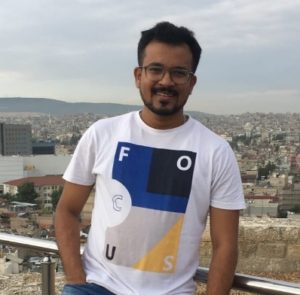 Mushtaq Ahmed is an Assistant Professor of Professional Communication Ethics and Communication Skills in the Humanities and Sciences Department at Datta Meghe College of Engineering, where he teaches written communication, technical writing and placement skills to third year students. He is an M.A. Honours in English Literature and MPhil from the Department of English, University of Mumbai. He identifies himself as a teacher educator and a pedagogue.
Mushtaq Ahmed is an Assistant Professor of Professional Communication Ethics and Communication Skills in the Humanities and Sciences Department at Datta Meghe College of Engineering, where he teaches written communication, technical writing and placement skills to third year students. He is an M.A. Honours in English Literature and MPhil from the Department of English, University of Mumbai. He identifies himself as a teacher educator and a pedagogue.
His research interests focus on the pedagogic intersections between transcultural and refugee studies with specific emphasis on the interrelationships between integration policies, humanitarian rights, equity and inclusion. He has presented guest lectures and facilitated workshops at esteemed universities and institutes, in his home country and abroad. He is a certified Youth Leadership and Social Change Trainer from the esteemed Centre for Lifelong Learning at the Tata Institute of Social Sciences, deemed University. In his free time, he volunteers for a local NGO, supporting the values of youth leadership and youth empowerment.
Diaspora Studies Series
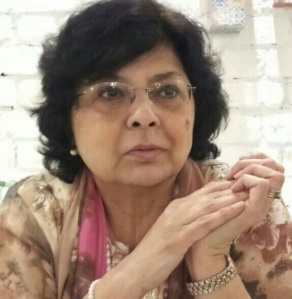 |
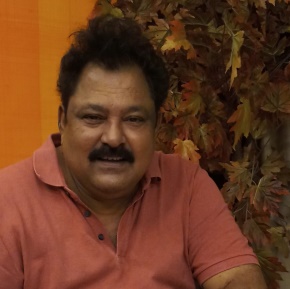 |
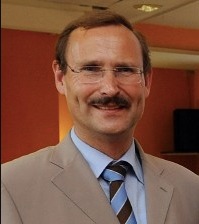 |
|
| Series Editors: | Professor Nilufer E. Bharucha | Professor Sridhar Rajeswaran | Professor Klaus Stierstorfer |
Diaspora Studies Series is an interdisciplinary series developed by the Constructions of Home and Belonging Indian Diaspora Centre (CoHaB IDC), University of Mumbai. It focusses on cutting edge research produced in the context of the Diaspora at the intersections of literature, cinema, sociology, history, economics and politics. It encourages interaction between these disciplines in the context of the changing trajectories of diaspora studies in the new Millennium. The focus will inevitably be on the Indian Diaspora as it is the second largest diaspora today with over 26 million Persons of Indian Origins living in over a 100 countries around the world. With the globalisation of the Indian economy this diaspora is becoming increasingly visible in the host countries and of vital importance within the home country of India too. The Indian Diaspora today is also active politically, culturally and economically in its host lands and needs to be studied in all its varied aspects.
However other global diasporas, especially in the context of the new millennium, will also be under the scanner in this series, such as the Eastern European and Russian in the post-communist era. In this millennium we also have to deal with the issue of the displacement of thousands of men, women and children through wars in Syria, Yemen and other places in the Middle East. These refugees from violence and bloodshed are beginning to constitute new and often contentious diasporas in Europe and North America. Political changes in the European Union, such as Brexit, have placed question marks on the continuing residence of countless European citizens in Britain and the possible backlash against British citizens living for generations in other European countries.
This series will thus look at classic diasporas as well as focus on diasporas in the new millennium where the older constructs of diaspora as a fixed construct with binary oppositions of old and new homelands has been replaced by more fluid constructs of transnationalisms. There is also the emerging trend of de-diasporisation and living in post-diaspora societies in for instance an economically resurgent India.
This series will contribute to the rise and consolidation of the study of Diaspora in the New Millennium and provide fresh perspectives on older diasporic theories and emergent post-diaspora work. It will thus provide new and challenging perspectives from home, host and transnational locations. Given its scope, the readership of the volumes in this series should be students, researchers and teachers of diaspora studies at universities around the world.
International Advisory Board
Fakrul Alam, East West University, Bangladesh
Ameena Ansari, Department of English, Jamia Millia University, New Delhi, India
Satwinder Bains, South Asian Studies Institute, University of the Fraser Valley, Canada
Nandi Bhatia, Department of English, Western University, Canada
Avtar Brah, Department of Sociology, Birbeck, University of London
Kamala Ganesh, Formerly Department of Sociology, University of Mumbai, India
Khyati Joshi, School of Education, Fairleigh Dickinson University, USA
Chandani Lokuge, Faculty of Arts, Monash University, Australia
Somdatta Mandal, Formerly Department of English, Visavabharati University, Shantiniketan, India
Renu Modi, Centre for African Studies, University of Mumbai, India
Mala Pandurang, Department of English, BMN College, SNDT Women’s University, Mumbai, India
Anisur Rahman, Rekhta Foundation, New Delhi, India
Ajaya Sahoo, Centre for Study of the Indian Diaspora, University of Hyderabad, India
Jason Scorza, Department of Political Science and Philosophy, Fairleigh Dickinson University, NJ, USA
Mark Stein, Postcolonial and Media Studies, WW University of Muenster, Germany
Dolly Sunny, Mumbai School of Economics and Public Policy, University of Mumbai, India
John Thieme, School of Literature Drama and Creative Writing, University of East Anglia, UK
Janet Wilson, Department of English, Northampton University, UK
Volume I: Beyond Borders and Boundaries: Diasporic Images in Literature and Cinema
Editors Nilufer E. Bharucha, Sridhar Rajeswaran, Klaus Stierstorfer, Diasporic Constructions of Home and Belonging – Indian Diaspora Centre, University of Mumbai, NavVishnu Publications, 2018.
ISBN: 978-81-933307-6-0
Price: Rs. 900 Euros: 27 (10% discount for academic institutions and faculty. 20% discount for students)
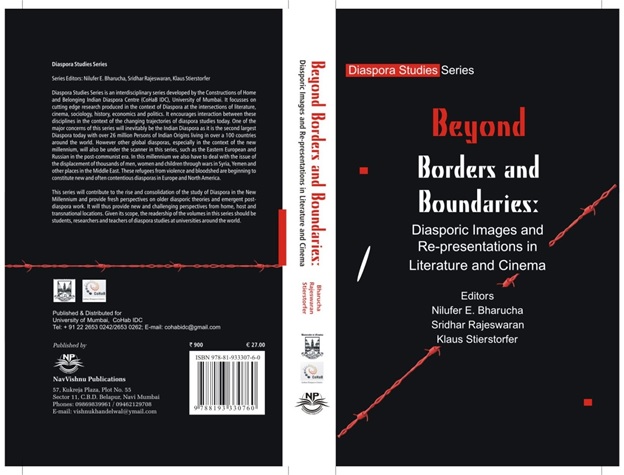
Launched on 25 July 2018 by Her Excellency Mukta Dutta Tomar, Indian Ambassador to Germany, at the Study India Day, WW University of Muenster, Muenster, Germany, the first volume in the – series is directed at adding new perspectives to the academic understanding of diaspora studies. This volume helps broaden the understanding of diaspora into the political, economic, socio cultural realms for researchers in this field. The voluntary or involuntary movement of individuals and groups across international borders results in a diaspora which could be caused by economic necessities, political incompatibilities, human aspirations, armed conflicts, trade and globalization. Diasporas could also be internal in the sense that they do not cross national boundaries. All these diasporas could result in identitarian crises and problems with acceptance from older, more settled populations. These problems take on new dimensions when the diasporic communities are challenged with the changing expectations of their own second and third generation descendants. All these issues are reflected in literature and cinema which has emerged from across such diasporic borders and boundaries.
In this volume, researchers from around the world have offered varied perspectives on the target areas. The articles analyse theoretical frameworks, literature and cinema and offer critique from ideological, socio-cultural and gender points of view. This volume isthus of interest to researchers and teachers of diaspora studies at universities around the world.
L-R: Professor Sridhar Rajeswaran, Professor Nilufer Bharucha, H.E. Mukta Dutta Tomar, Professor Klaus Stierstorfer
To view events report click here
Volume II: The Past, Present and Post Diaspora: New Directions in Diaspora Studies
Editors Nilufer E. Bharucha, Sridhar Rajeswaran, Klaus Stierstorfer, CoHab IDC (Diasporic Constructions of Home and Belonging – Indian Diaspora Centre), University of Mumbai.
ISBN: 978-163944425-0
Price: Rs. 900 Euros: 27 (10% discount for academic institutions and faculty. 20% discount for students)
The ebook of the second volume in Diaspora Studies Series was launched by the Honorable Vice Chancellor of the University of Mumbai, Professor Suhas Pednekar, via an online webcast on 16 June 2021.
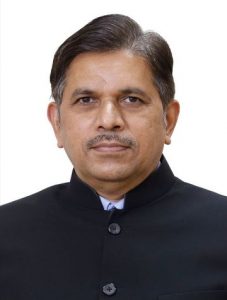 |
 |
| Professor Suhas Pednekar Honorable Vice Chancellor University of Mumbai |
Professor Janet Wilson Emerita Professor of English University of Northampton, UK |
Since the past two decades, many researchers have made scholarly interventions with respect to defining ‘diaspora’. An overused, over theorized yet an uncontested term, scholars have now begun to not only use it as a collective noun but also an adjective, a verb and an adverb: ‘diasporic’, ‘diasporization’, ‘post-diaspora’. In this volume we ask, what lies next? The basic focus of this volume is to examine, within an inter-disciplinary and an alternative framework, both the historical phenomena of ‘diaspora’ and contemporary alternative approaches to diaspora studies. It seeks to address the following questions: What constitutes the discourse of diaspora and diasporic culture? What is the current state of diaspora studies and what are its trajectories of evolution? What’s next and are we thinking post-diaspora/post diaspora? How does the language of various disciplines like economics, mathematics, sociology, history and so on travel and intermingle to define and expand the contours of the notion of “diaspora”? How does the language of literature in the form of novels, poetry, short stories, plays, films, other forms of visual arts, social and mass media shape or define diasporic cultures? Who is representing them and how? What is the role of literary devices like allegory, fantasy, wit, satire, etc in representing particular diasporic trajectories and what is the result of such representations? Thus, this volume aims to be a part of a new emerging inclusive interdisciplinary research and promotes a dialogue to encourage development in diaspora studies. The essays in this volume have been contributed by national and international scholars on diaspora studies.
To view events report click here
Forthcoming:
Volume III: A Mahatma in Waiting: The Diasporic Gandhi Re-visited on his 150th Birth Anniversary
Editors Nilufer E. Bharucha, Sridhar Rajeswaran, Klaus Stierstorfer, CoHab IDC (Diasporic Constructions of Home and Belonging – Indian Diaspora Centre), University of Mumbai, 2022.
In 2015, India celebrated the centenary of one of the most influential Indian diasporic’s return to India. It was on 9th January, 1915 that Mohandas Karamchand Gandhi had returned to India after 21 years in the South African diaspora. The papers in this volume seek to traverse the time and space in which Gandhi attained his life experiences and in which he practiced and perfected his political and personal philosophies that contributed not just to his own growth, but to the evolution of India from a colony into an independent nation. His South African diaspora of 21 long years and the lessons he learnt there in the political and spiritual fields, shaped this man’s later life and is hence crucial to an understanding of how a man became a Mahatma. There is today not just a distance in time between Gandhi’s birth, but India and Africa are today not the same places that they were in Gandhi’s lifetime. A postcolonial and now global world has taken the place of the former Imperial spaces. It would be interesting to see how Africans and Indians, men and women, today react to this man who went to Africa in a formal Western suit and left it in a dhoti and a turban. What is the relevance of this man, this lawyer, this Mahatma, in the Twenty First century? The essays in this volume have examined various aspects of Gandhi in diaspora and have been written by scholars from Africa, Europe and India.
Purchase and Orders:
For purchasing Volume II, visit https://www.amazon.in/dp/B093Q4GWM9
For purchasing volume I and placing pre-orders for volume III, please contact: cohabidc@gmail.com
- Report on ‘The Indian Ocean as Memory Space’: The Indian Diaspora in Mauritius, East and South Africa on 28 September 2021
- Report on the Online Book Launch of CoHaB IDC’s New Directions in Diaspora Studies: Revisiting the Past, Reviewing the Present and Looking at the Future on 16 June 2021
- Report on the Creative Writing Webinar on 20 March 2021
- Report on the Musical Presentation on The Pull of the Homeland: Music in Bollywood Cinema on the Indian Diaspora on 24 February 2021
- Report on Diaspora and International Laws: Reflections in Society and Culture on 14 December 2020
- Report on Lecture Series on the Indian Diaspora on 18 January 2021
- Report on the Online Book Launch: The Sikh Next Door: An Identity in Transition by Dr. Manpreet J. Singh
- Report on the Indian Navy and the Diaspora by Commodore Srikant Kesnur in the Law, Literature and Diaspora Lecture Series
- Report on Exploring the Aesthetics of an Asian-African Heritage through the Work of Sultan Somjee by Professor Mala Pandurang under CoHaB IDC’s Diaspora Lecture Series
- Report on Law and Literature and the Indian Diaspora in Colonial Africa by Advocate Pheroze Nowrojee in the Law, Literature and Diaspora Series
- Report on the Inaugural Lecture in the Law, Literature and Diaspora Series by Advocate Armin Wandrewala
- Report on the National Symposium on Indian Diaspora Studies
- Report on the International Symposium on the Indian Diaspora
- Report on the CoHaB IDC Fellowship Lecture Series
- Report on Round Table on Law, Literature and Diaspora
- Report on the talk by Derek Mascarenhas on Coconut Dreams
- Report on Dr. Janet Wilson’s Talk
- Report on the Joint International Conference
- Report on CoHaB IDC’s conference
- Lecture Series 2019-2020
- Interdisciplinary International Conference “A Mahatma in Waiting: The Diasporic Gandhi Re-visited on his 150th Birth Anniversary”
- Report on the Study India Day Programme and the Book Launch
- Book Cover: Diaspora Studies Series Volume I
- Study India Day
- Report on International Joint Symposium
- International AFRASO Symposium “Afrasian Interactions: Current Dynamics, Future Perspectives”
- Report on the talk by Professor Khyati Joshi
- Report on the Film Screening – The Namesake
- Report on the talk by Pheroze Nowrojee
- Report on Professor Röschenthaler’s talk
- Africans in Malaysia by Ute Röschenthaler
- A Report on Dr. Ecaterina Balica’s Video Lecture
- A Report on the 160th Annual Convocation
- A Report on Java Singh’s talk
- Joint International Conference The Past, Present and Post ‘Diaspora’: New Directions in Diaspora Studies A Report
- A Report on Dr John Njenga Karugia’s Interactive Discussion on ‘Connective Afrasian Ocean Memories: Between Competitive and Multidirectional Remembering’
- Visiting-Researcher-at-CoHaB-IDC
- Report on Prof. Dr. Klaus Stierstorfer’s Talk on Diaspora Studies Reader
- Report on Dr. Renu Modi’s talk on Indian Diaspora in South Africa
- Mumbai SS Report
- Report on the CoHaB IDC’s External Lecture: Lecture on Diaspora Studies for the Literature Association of the Jai Narain Vyas University, Jodhpur, on 16 July 2021
- CoHaB IDC’s External Lecture: Professor Nilufer E. Bharucha’s online lecture on Jane Austen’s Emma for TYBA English students in Konkan region
- Review of New Directions in Diaspora Studies: Revisiting the Past, Reviewing the Present and Looking at the Future
- ‘The Indian Ocean as Memory Space’: The Indian Diaspora in Mauritius, East and South Africa on 28 September 2021
- Online Book Launch of CoHaB IDC’s New Directions in Diaspora Studies: Revisiting the Past, Reviewing the Present and Looking at the Future on 16 June 2021
- Creative Writing Webinar on 20 March 2021
- The Pull of the Homeland: Music in Bollywood Cinema on the Indian Diaspora on 24 February 2021
- Lecture Series on the Indian Diaspora on 18 January 2021
- Diaspora and International Laws: Reflections in Society and Culture on 14 December 2020
- The Law, Literature and Diaspora Lecture Series, Lecture 3: The Indian Navy and the Diaspora by Commodore Srikant Kesnur on 27 October 2020
- Online Book Launch of Dr. Manpreet Singh’s The Sikh Next Door: An Identity in Transition on 22 October 2020
- Exploring the Aesthetics of an Asian-African Heritage through the Work of Sultan Somjee by Professor Mala Pandurang under CoHaB IDC’s Diaspora Lecture Series on 18 September 2020
- The Law, Literature and Diaspora Lecture Series, Lecture 2: Law and Literature and the Indian Diaspora in Colonial Africa by Advocate and Author Pheroze Nowrojee on 20 August 2020
- Inaugural Lecture in the Law, Literature and Diaspora Series, by CoHaB IDC, University of Mumbai, given by Advocate and Author Armin Wandrewala on 18 July 2020
- The Indian Diaspora in the Era of Globalization
- Video on Indian Diasporic Literature in English
- Review of book
Lecture Series and Workshops for the Academic Years 2019-2020 and 2020-2021:
- CoHaB Indian Diaspora Centre and Centre of Excellence in Maritime Studies: The Indian Ocean as Memory Space’: The Indian Diaspora in Mauritius, East and South Africa on 28 September 2021 | 3:00 to 5:30 PM IST
- Book Launch of Volume II of Diaspora Studies Series on 16 June 2021 at 3 PM IST
- International Webinar on Diasporic/Sojourner Creative Writing on 20 March 2021 – 2:00 to 5:00 pm IST
- CoHaB IDC’s Advertisement for Research Associate
- Webcast | A Musical Presentation on The Pull of the Homeland: Music in Bollywood Cinema on the Indian Diaspora by Nihaarika Sinha on 24 February 2021 from 1:00 – 3:00 PM IST
- Webcast of the Lecture Series on the Indian Diaspora on 18 January 2021|2:30 – 5:30 PM
- Webinar on ‘Diaspora and International Laws Reflections in Society and Culture’ on 14 December 2020 from 2:00 PM to 5:00 PM IST
- CoHaB IDC’S ‘Law, Literature and Diaspora Lecture Series’, Lecture 3: “The Indian Navy and the Diaspora” by Commodore Srikant Kesnur on 27 October 2020 from 3:00 PM to 5:15 PM
- CoHaB IDC’s Extension Lectures: Professor Nilufer E. Bharucha’s online lecture on Jane Austen’s Emma for TYBA English students in Konkan region
- Book Launch of Dr. Manpreet Singh’s book The Sikh Next Door: An Identity in Transition on 22 October 2020 at 9:00 AM Indian Standard Time
- Diaspora Lecture Series – Lecture by Professor Mala Pandurang on Exploring the Aesthetics of an Asian-African Heritage through the Work of Sultan Somjee on 18 September 2020, 3:30 – 5:30 PM IST
- Law, Literature and Diaspora Lecture Series, Lecture 2: International Webcast of ‘Law and Literature and the Indian Diaspora in Colonial Africa’ by Advocate Pheroze Nowrojee on 20 August 2020, 3:00 – 5:00 PM IST
- Law, Literature and Diaspora Lecture Series: International Webcast of the Inaugural Lecture by Advocate Armin Wandrewala on 18th July 2020
- National Symposium on Indian Diaspora Studies on 17 February 2020
- International Symposium on the Indian Diaspora on 6 February 2020
- Lecture Series by Dr. Meera Venkatachalam on 14th, 21st and 28th January 2020
- Round Table on Law, Literature and Diaspora on 17th December 2019
- Talk by Derek Mascarenhas on Coconut Dreams on 12th December 2019
Forthcoming:
- Professor Sridhar Rajeswaran, CoHaB IDC Advisory Committee Member, will deliver a lecture on ‘Gandhi: The Lawyer and the Writer’ in September/October 2021.
- Professor Rebecca Haque, Professor, Dhaka University, will deliver a lecture. Date to be announced.
- Paromita Chakrabarti, Asst. Professor, HR College, Mumbai, will deliver a lecture. Date to be announced.
Academic Staff
Professor Dr. Nilufer E. Bharucha
Director and Scientist-in-Charge, CoHaB IDC, University of Mumbai.
 NILUFER E. BHARUCHA is the Director and Scientist in Charge of the Constructions of Home and Belonging Indian Diaspora Centre (CoHaB IDC) and Visiting Professor in Humanities at the Centre for Excellence in Basic Sciences, University of Mumbai. She is a former Senior Professor and Head of the Department of English, University of Mumbai. She is Faculty Associate Emeritus of the South Asian Studies Institute, University of the Fraser Valley, Canada and is on the Global Faculty of the Fairleigh Dickinson University, N.J., USA. .
NILUFER E. BHARUCHA is the Director and Scientist in Charge of the Constructions of Home and Belonging Indian Diaspora Centre (CoHaB IDC) and Visiting Professor in Humanities at the Centre for Excellence in Basic Sciences, University of Mumbai. She is a former Senior Professor and Head of the Department of English, University of Mumbai. She is Faculty Associate Emeritus of the South Asian Studies Institute, University of the Fraser Valley, Canada and is on the Global Faculty of the Fairleigh Dickinson University, N.J., USA. .
Professor Bharucha has served on the juries for the Commonwealth Literature Prize, U.K. and the English Literature Prize of the Sahitya Akademi, Delhi. She has also served on the jury for the Rhodes Scholarships.
She was awarded a British Council Scholarship for study at the University of Manchester in 1981- 82 and the Commonwealth Academic Staff Fellowship for post-doctoral research at the Queen Mary and Westfield College, University of London in 1994-95.
In 2001 she was awarded the German Gender Studies Professorship at the University of Cologne for one semester. In 2007 she was awarded a Visiting Professorship by the Shastri Indo-Canadian Institute for lecturing at universities in Canada. DAAD (German Academic Exchange Service) has awarded her visiting professorships in 2000 and 2008 at the Universities of Siegen and Muenster in Germany. In the summer semester of 2012 she was awarded the Indian Council for Cultural Relations (ICCR) Rotating Chair at the University of Muenster, Germany.
From 1996 onwards she has been a Visiting Professor in Postcolonial Literatures, Diasporic Indian Cinema and Hindi Cinema at several universities in Europe such as the Otto-Von-Guericke University, Magdeburg, the University of Cologne, the University of Dusseldorf, the University of Bonn in Germany, the University of Barcelona in Spain and the University of Avignon in France.
From 2016 onwards she has been a regular Visiting Professor in Postcolonial Indian Literature and Cinema at the WW University, Muenster, Germany. In 2016 and 2017 she had visited the Bayreuth University, Germany for workshops and lectures for the English Department and given lectures and interacted with scholars at the Bayreuth Academy for Advanced African Studies.
At the Mumbai University she has supervised 16 Ph.D. theses and 8 M.Phil. dissertations. She is currently supervising 1 more Ph.D. thesis.
She has studied at the University of Bombay, the English and Foreign Languages University, Hyderabad and the University of Manchester, U.K.
Her areas of specialisation are Postcolonial Literatures and Theories, Literature of the Indian Diaspora, the Writings of the Parsis, Diasporic Indian Cinema and Hindi Cinema. She has authored two books and edited five more. Sixty of her articles and seventeen review essays have appeared in peer-reviewed journals and in critical anthologies published in India and abroad.
She is on the advisory of board of academic journals in the West and in India. She has published several short-stories which have been published and has done translations from the Urdu. She has also published translations of poems and short stories from Gujarati into English and the translation of a Gujarati novel is forthcoming.
20 May 2020
PROFESSOR NILUFER E. BHARUCHA
Director and Scientist-in-Charge CoHaB IDC
Kirti Risbud, Research Associate
 Kirti Risbud is Research Associate in the CoHaB Indian Diaspora Centre. She has a Master’s degree in English Literature from the University of Mumbai with specialization in postcolonial literature.
Kirti Risbud is Research Associate in the CoHaB Indian Diaspora Centre. She has a Master’s degree in English Literature from the University of Mumbai with specialization in postcolonial literature.
Ms. Risbud has earlier worked for the Group for Research on the Indian Diaspora (GRID), a UPE project, at the University of Mumbai. She has also worked in the content development and instructional design fields at Vibgyor High and Accenture. She has also been a freelance editor in the past.
 Mr. Shashikant Sawant is Office Assistant at the CoHaB IDC. He assists in performing administrative duties needed to keep the Centre running efficiently.
Mr. Shashikant Sawant is Office Assistant at the CoHaB IDC. He assists in performing administrative duties needed to keep the Centre running efficiently.
Press release
MMIAS will be publishing proceedings of its conferences, lectures series and monographs. It will administer the publications of the CoHaB IDC and can be contacted for the purchase of the 2 volumes of the Diaspora Studies Series, which will henceforth be called the MMIAS Diaspora Studies Series.
Series Editors:
Professor Nilufer E. Bharucha Professor Sridhar Rajeswaran Professor Klaus Stierstorfer
Diaspora Studies Series is an interdisciplinary series developed by the Constructions of Home and Belonging Indian Diaspora Centre (CoHaB IDC), University of Mumbai. It focusses on cutting edge research produced in the context of the Diaspora at the intersections of literature, cinema, sociology, history, economics and politics. It encourages interaction between these disciplines in the context of the changing trajectories of diaspora studies in the new Millennium. The focus will inevitably be on the Indian Diaspora as it is the second largest diaspora today with over 26 million Persons of Indian Origins living in over a 100 countries around the world. With the globalisation of the Indian economy this diaspora is becoming increasingly visible in the host countries and of vital importance within the home country of India too. The Indian Diaspora today is also active politically, culturally and economically in its host lands and needs to be studied in all its varied aspects.
However other global diasporas, especially in the context of the new millennium, will also be under the scanner in this series, such as the Eastern European and Russian in the post-communist era. In this millennium we also have to deal with the issue of the displacement of thousands of men, women and children through wars in Syria, Yemen and other places in the Middle East. These refugees from violence and bloodshed are beginning to constitute new and often contentious diasporas in Europe and North America. Political changes in the European Union, such as Brexit, have placed question marks on the continuing residence of countless European citizens in Britain and the possible backlash against British citizens living for generations in other European countries.
This series will thus look at classic diasporas as well as focus on diasporas in the new millennium where the older constructs of diaspora as a fixed construct with binary oppositions of old and new homelands has been replaced by more fluid constructs of transnationalisms. There is also the emerging trend of de-diasporisation and living in post-diaspora societies in for instance an economically resurgent India.
This series will contribute to the rise and consolidation of the study of Diaspora in the New Millennium and provide fresh perspectives on older diasporic theories and emergent post-diaspora work. It will thus provide new and challenging perspectives from home, host and transnational locations. Given its scope, the readership of the volumes in this series should be students, researchers and teachers of diaspora studies at universities around the world.
Volume I: Beyond Borders and Boundaries: Diasporic Images in Literature and Cinema
Editors Nilufer E. Bharucha, Sridhar Rajeswaran, Klaus Stierstorfer, Diasporic
Constructions of Home and Belonging – Indian Diaspora Centre, University of Mumbai, NavVishnu Publications, 2018.
ISBN: 978-81-933307-6-0
Price: Rs. 900 Euros: 27 (10% discount for academic institutions and faculty. 20% discount for students)
Launched on 25 July 2018 by Her Excellency Mukta Dutta Tomar, Indian Ambassador to Germany, at the Study India Day, WW University of Münster, Münster, Germany, the first volume in the – series is directed at adding new perspectives to the academic understanding of diaspora studies. This volume helps broaden the understanding of diaspora into the political, economic, socio cultural realms for researchers in this field. The voluntary or involuntary movement of individuals and groups across international borders results in a diaspora which could be caused by economic necessities, political incompatibilities, human aspirations, armed conflicts, trade and globalization. Diasporas could also be internal in the sense that they do not cross national boundaries. All these diasporas could result in identitarian crises and problems with acceptance from older, more settled populations. These problems take on new dimensions when the diasporic communities are challenged with the changing expectations of their own second and third generation descendants. All these issues are reflected in literature and cinema which has emerged from across such diasporic borders and boundaries.
In this volume, researchers from around the world have offered varied perspectives on the target areas. The articles analyse theoretical frameworks, literature and cinema and offer critique from ideological, socio-cultural and gender points of view. This volume isthus of interest to researchers and teachers of diaspora studies at universities around the world.
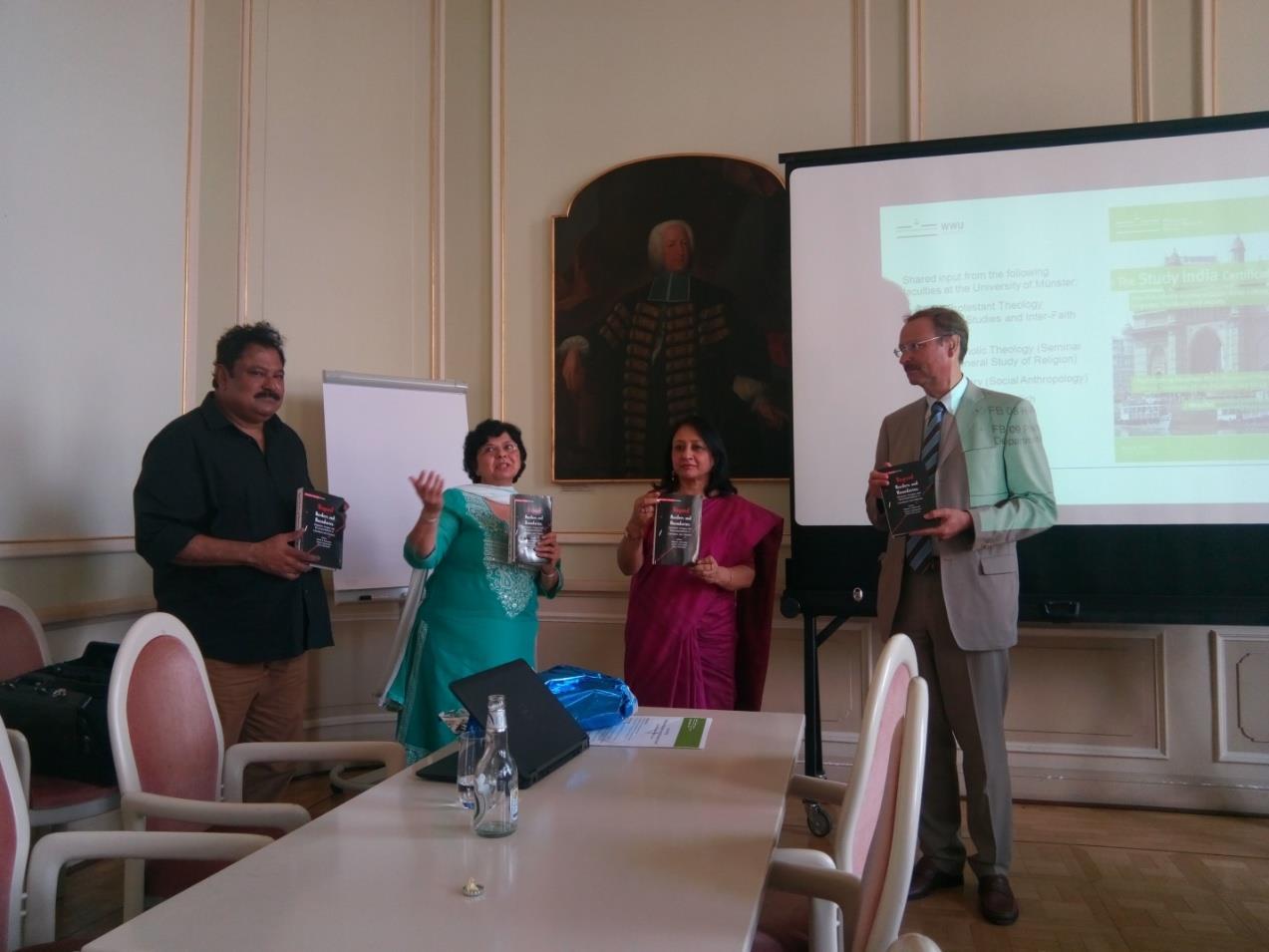 L-R: Professor Sridhar Rajeswaran, Professor Nilufer Bharucha, H.E. Mukta Dutta Tomar, Professor Klaus Stierstorfer
L-R: Professor Sridhar Rajeswaran, Professor Nilufer Bharucha, H.E. Mukta Dutta Tomar, Professor Klaus Stierstorfer
Volume II: The Past, Present and Post Diaspora: New Directions in Diaspora Studies
Editors Nilufer E. Bharucha, Sridhar Rajeswaran, Klaus Stierstorfer, CoHab IDC (Diasporic Constructions of Home and Belonging – Indian Diaspora Centre), University of Mumbai.
ISBN: 978-163944425-0
Price: Rs. 900 Euros: 27 (10% discount for academic institutions and faculty. 20% discount for students)
The ebook of the second volume in Diaspora Studies Series was launched by the Honorable Vice Chancellor of the University of Mumbai, Professor Suhas Pednekar, via an online webcast on 16 June 2021.
Professor Suhas Pednekar Professor Janet Wilson
Honorable Vice Chancellor Emerita Professor of English
University of Mumbai University of Northampton, UK
Since the past two decades, many researchers have made scholarly interventions with respect to defining ‘diaspora’. An overused, over theorized yet an uncontested term, scholars have now begun to not only use it as a collective noun but also an adjective, a verb and an adverb: ‘diasporic’, ‘diasporization’, ‘post-diaspora’. In this volume we ask, what lies next? The basic focus of this volume is to examine, within an inter-disciplinary and an alternative framework, both the historical phenomena of ‘diaspora’ and contemporary alternative approaches to diaspora studies. It seeks to address the following questions: What constitutes the discourse of diaspora and diasporic culture? What is the current state of diaspora studies and what are its trajectories of evolution? What’s next and are we thinking post-diaspora/post diaspora? How does the language of various disciplines like economics, mathematics, sociology, history and so on travel and intermingle to define and expand the contours of the notion of “diaspora”? How does the language of literature in the form of novels, poetry, short stories, plays, films, other forms of visual arts, social and mass media shape or define diasporic cultures? Who is representing them and how? What is the role of literary devices like allegory, fantasy, wit, satire, etc in representing particular diasporic trajectories and what is the result of such representations? Thus, this volume aims to be a part of a new emerging inclusive interdisciplinary research and promotes a dialogue to encourage development in diaspora studies. The essays in this volume have been contributed by national and international scholars on diaspora studies.
Forthcoming:
Volume III: A Mahatma in Waiting: The Diasporic Gandhi Re-visited on his 150th Birth Anniversary
Editors Nilufer E. Bharucha, Sridhar Rajeswaran, Klaus Stierstorfer, CoHab IDC (Diasporic Constructions of Home and Belonging – Indian Diaspora Centre), University of Mumbai, 2022.
In 2015, India celebrated the centenary of one of the most influential Indian diasporic’s return to India. It was on 9th January, 1915 that Mohandas Karamchand Gandhi had returned to India after 21 years in the South African diaspora. The papers in this volume seek to traverse the time and space in which Gandhi attained his life experiences and in which he practiced and perfected his political and personal philosophies that contributed not just to his own growth, but to the evolution of India from a colony into an independent nation. His South African diaspora of 21 long years and the lessons he learnt there in the political and spiritual fields, shaped this man’s later life and is hence crucial to an understanding of how a man became a Mahatma. There is today not just a distance in time between Gandhi’s birth, but India and Africa are today not the same places that they were in Gandhi’s lifetime. A postcolonial and now global world has taken the place of the former Imperial spaces. It would be interesting to see how Africans and Indians, men and women, today react to this man who went to Africa in a formal Western suit and left it in a dhoti and a turban. What is the relevance of this man, this lawyer, this Mahatma, in the Twenty First century? The essays in this volume have examined various aspects of Gandhi in diaspora and have been written by scholars from Africa, Europe and India.
Purchase and Orders:
For purchasing Volume II, visit https://www.amazon.in/dp/B093Q4GWM9
For purchasing volume I and placing pre-orders for volume III, please
contact: office.mmias@mu.ac.in
MMIAS appoints Fellows, Researchers and Interns who carry on their own independent research during their appointments and share their research findings with the MMIAS through in-person and virtual lectures/workshops and symposiums.
MMIAS Researcher: Mr. Mushtaq Shaikh is MMIAS Researcher from 1 January 2022 to 31st December 2022. As the Institute’s Researcher, Mushtaq conducts online workshops, lectures and discussions in the area of pedagogic intersections between transcultural and refugee studies. (See <add event link>)
 Mushtaq is an Assistant Professor of Professional Communication Ethics and Communication Skills in the Humanities and Sciences Department at Datta Meghe College of Engineering, where he teaches written communication, technical writing and placement skills to third year students. He is an M.A. Honours in English Literature and MPhil from the Department of English, University of Mumbai. He identifies himself as a teacher educator and a pedagogue.
Mushtaq is an Assistant Professor of Professional Communication Ethics and Communication Skills in the Humanities and Sciences Department at Datta Meghe College of Engineering, where he teaches written communication, technical writing and placement skills to third year students. He is an M.A. Honours in English Literature and MPhil from the Department of English, University of Mumbai. He identifies himself as a teacher educator and a pedagogue.
His research interests focus on the pedagogic intersections between transcultural and refugee studies with specific emphasis on the interrelationships between integration policies, humanitarian rights, equity and inclusion. He has presented guest lectures and facilitated workshops at esteemed universities and institutes, in his home country and abroad. He is a certified Youth Leadership and Social Change Trainer from the esteemed Centre for Lifelong Learning at the Tata Institute of Social Sciences, deemed University. In his free time, he volunteers for a local NGO, supporting the values of youth leadership and youth empowerment.
 MMIAS Intern: Ms. Shikha Mehta, B.A. (Hons) in English Literature student of the School of Liberal Arts, Auro University, Surat, joined the MMIAS for a short-term internship in January 2022. At the end of her internship she made an oral presentation and submitted a written report. (See <add event link>)
MMIAS Intern: Ms. Shikha Mehta, B.A. (Hons) in English Literature student of the School of Liberal Arts, Auro University, Surat, joined the MMIAS for a short-term internship in January 2022. At the end of her internship she made an oral presentation and submitted a written report. (See <add event link>)
Shikha is currently pursuing a BA Honours in English Literature at the School of Liberal Arts & Sciences, AURO University, Surat. Shikha has a penchant for learning languages: out of the six she knows, she is extremely fluent in four of them. Her interests lie in exploring languages, cultures and identities – spanning nations as well as the self. The Eastern countries hold her interest owing to their individual culture as well their similarities with the Indian culture. She is a writer and an avid reader, and an artist. She works as a cover designer in her free time and explores art forms when she can.
CONTACT US
Location:
Room 102, Ranade Bhavan, Kalina Campus, University of Mumbai,
Santacruz (East), Mumbai 400032, India
Email: cohabidc@gmail.com

